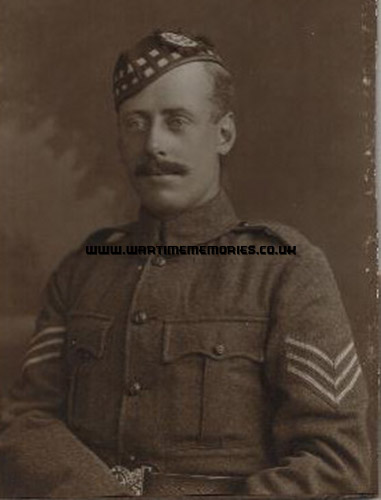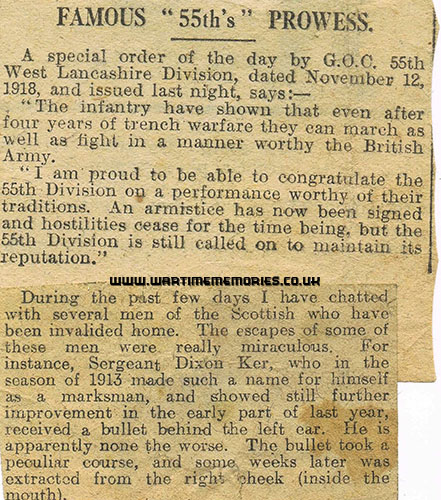Additions will be checked before being published on the website and where possible will be forwarded to the person who submitted the original entries. Your contact details will not be forwarded, but they can send a reply via this messaging system.
please scroll down to send a message
CQMS Dixon "Dickie" Ker
British Army 10th (Liverpool Scottish) Battalion Kings Liverpool Regiment
from:West Oakfield, Hooton, Wirral
This account was published in the the Lucton School (Herefordshire) magazine Vol. 8 no.24 April 1915. The author of the article is dixon ker, my grandfather, who wrote the letter which was edited for his old school magazine after he had been wounded on 6th of December 1914 during the First Battle of Ypres.
The Journey to the Trenches
On January 1st Dixon Ker wrote from the Military Hospital at Lakenham,Norwich, where he was convalescing, a letter from which the following are extracts.
We left Southampton on November 1st for Le Havre where we stood off all day on the 2nd till about 10.30 p.m., when we docked and slept aboard. The following morning we disembarked and had about four miles march to a camp where we spent the next night; leaving on the 4th we entrained at 7 p.m. for an unknown destination. The train journey was lovely; we were packed in cattle trucks with wooden seats, and as we were 30 in each truck we had to sleep in the same, it was a fair crush, what with rifles and packs but we had to make the best of it for about 24 hours when we arrived at St. Omer about 7.30 p.m. After being on fatigues, getting stores and transport ready for marching off it was close upon midnight before we left the station. The company that I am being detailed for baggage guard. We did not arrive at our billets about 5 miles away, till 2.30 a.m. owing to the bad state of the roads and the difficulty of getting the wagons along. The Battalion was billeted in barns and stables at a place called Blendecques, where we spent November 6th to November 19th, training and getting ready for the front. The only thing of interest that happened was the lining of the streets at St. Omer on November 17th when the body of Lord Roberts passed through on its way to England. The Prince of Wales was also present.
On the morning of November 20th we left Blendecques and marched about 18 miles, to Hazebruck where we stopped the night in barns in the vicinity. The roads were like glass owing to a sharp frost on top of rain. I think it was the hardest day we had and we were all very tired and soon fell asleep. Next morning we were on the move again and had 12 miles to do, but the roads were much better owing to a thaw, and we arrived at Bailleul where we billeted in empty houses about 10 miles behind the firing line. On the 22nd and 23rd we rested, but on the 24th we had a route march and we halted in a valley with some of our long-range artillery in the rear. This was done to give us a taste of firing overhead and I must say it made us jump at first hearing the shells whizzing over our heads, but we soon got used to it and then we were taken back to our billets.
We were inspected by General Sir Smith-Dorrien on November 25th, the Prince of Wales being present. After a few remarks by the General we left to join the Brigade we were to be attached to. We soon crossed the Franco-Belgian frontier and, my word! the roads were like little duck ponds. We could only get along very slowly as we had to pass the transports that were coming the other way. We spent the next two nights in a barn at Westoutre. Leaving there about 3 p.m. on November 27th we marched to a place called Kemmell, south of Ypres. It was near here that we had to relieve some others in the trenches, and as the left half Battalion were for duty the right half were billeted in a deserted farm which had escaped destruction. We were packed like sardines in stables, barns and even pigstyes, anywhere with a roof, until 8.30 p.m. on November 30th. It was here that we had a captain killed in the trenches and one wounded; so we came through our first week luckily, although we had to repulse several attacks. I think if we had to stop in the farm much longer some of us would have gone mad as we had to stay under cover practically all the time on account of an enemy aeroplane seeing us and getting their artillery to open fire on us. It was quite bad enough without that as our artillery was in a wood behind us, which they could not put out of action, and we were being fired over practically all day, and some shells fell not 40 yards from us, but a great percentage of the German shells did not burst due to faulty timing. On leaving this place we marched, I mean crawled, back to billets at Westoutre where we stopped till mid-day on December 3rd, when we were inspected by His Majesty. We were drawn up in two ranks, along the road and he simply passed in a motor, looking very depressed as if he had seen enough of us. I am sure we were an awful sight. bespattered with mud and clay, as it was raining practically all the time I was in France or Belgium and we all looked the worse for it. We had about 2 ½ miles to march to fresh billets, which turned out to be dug-outs with straw roofs which would not keep the rain out and it was like being under a riddle.
On December 6th we went to the trenches. This time it was the Right Half of the Battalion's turn after a weary march along slushy roads we arrived at our old quarters, the Farm. As things turned out it was my luck to get a rifle bullet behind my left ear which penetrated my head and lodged in my right jaw, a most lucky escape as a shade higher and I would have been done for. Feeling dazed I was taken back to the Farm to have medical attention, before reaching the trenches. I have heard since that the three days they spent there were very cold and wet, and when they were relieved they were about done for. It took them all their time to walk as some of them were suffering frost-bitten feet. I left the Farm about 8 p.m., in a horse ambulance wagon, and spent the night at a place called Loare. From there I was taken to Bailleul and the next morning I was put in the train for Boulogne. I was suffering from a swollen cheek which was rather sore, but some of my companions in the carriage were very badly wounded. I spent 5 days in a hospital in Boulogne before I left with 60 others in a private yacht, called the ˜Albion, for Southampton. On arriving there all that were well enough had a nice warm bath which I am sure we needed. I underwent an operation on December 23rd and my souvenir was removed. They got it from the inside of my mouth so I shall not be disfigured. Now I am practically well again and just waiting for my warrant to go home for three weeks sick furlough.

